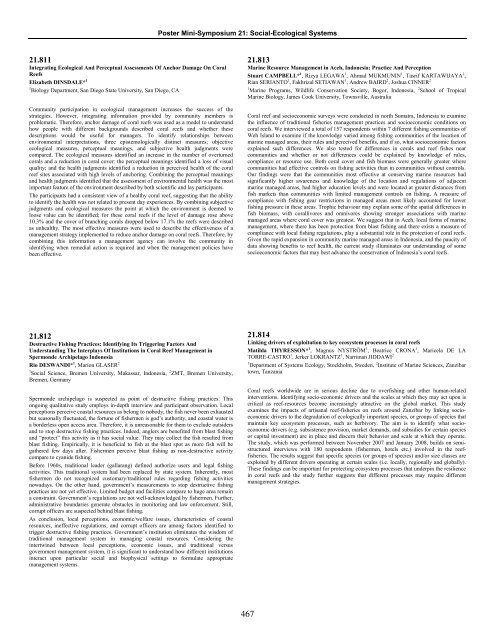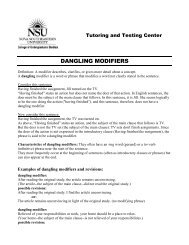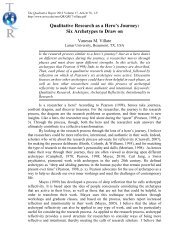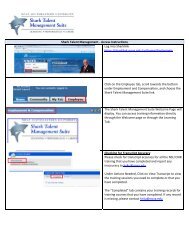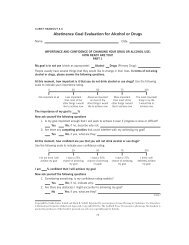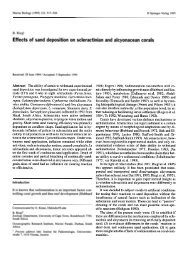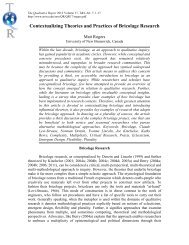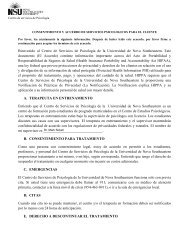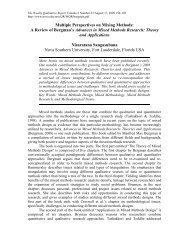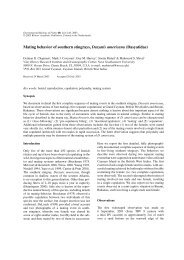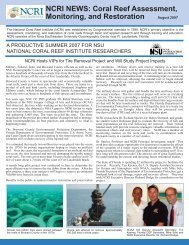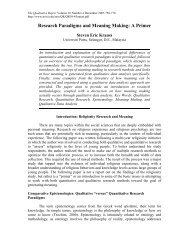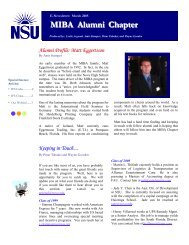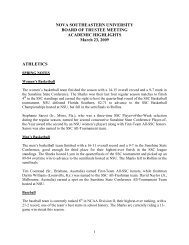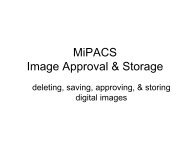11th ICRS Abstract book - Nova Southeastern University
11th ICRS Abstract book - Nova Southeastern University
11th ICRS Abstract book - Nova Southeastern University
You also want an ePaper? Increase the reach of your titles
YUMPU automatically turns print PDFs into web optimized ePapers that Google loves.
21.811<br />
Integrating Ecological And Perceptual Assessments Of Anchor Damage On Coral<br />
Reefs<br />
Elizabeth DINSDALE* 1<br />
1 Biology Department, San Diego State <strong>University</strong>, San Diego, CA<br />
Community participation in ecological management increases the success of the<br />
strategies. However, integrating information provided by community members is<br />
problematic. Therefore, anchor damage of coral reefs was used as a model to understand<br />
how people with different backgrounds described coral reefs and whether these<br />
descriptions would be useful for managers. To identify relationships between<br />
environmental interpretations, three epistemologically distinct measures; objective<br />
ecological measures, perceptual meanings, and subjective health judgments were<br />
compared. The ecological measures identified an increase in the number of overturned<br />
corals and a reduction in coral cover: the perceptual meanings identified a loss of visual<br />
quality; and the health judgments identified a reduction in perceived health of the coral<br />
reef sites associated with high levels of anchoring. Combining the perceptual meanings<br />
and health judgments identified that the assessment of environmental health was the most<br />
important feature of the environment described by both scientific and lay participants.<br />
The participants had a consistent view of a healthy coral reef, suggesting that the ability<br />
to identify the health was not related to present day experiences. By combining subjective<br />
judgments and ecological measures the point at which the environment is deemed to<br />
loose value can be identified; for these coral reefs if the level of damage rose above<br />
10.3% and the cover of branching corals dropped below 17.1% the reefs were described<br />
as unhealthy. The most effective measures were used to describe the effectiveness of a<br />
management strategy implemented to reduce anchor damage on coral reefs. Therefore, by<br />
combining this information a management agency can involve the community in<br />
identifying when remedial action is required and when the management policies have<br />
been effective.<br />
21.812<br />
Destructive Fishing Practices: Identifying Its Triggering Factors And<br />
Understanding The Interplays Of Institutions in Coral Reef Management in<br />
Spermonde Archipelago Indonesia<br />
Rio DESWANDI* 1 , Marion GLASER 2<br />
1 Social Science, Bremen <strong>University</strong>, Makassar, Indonesia, 2 ZMT, Bremen <strong>University</strong>,<br />
Bremen, Germany<br />
Spermonde archipelago is suspected as point of destructive fishing practices. This<br />
ongoing qualitative study employs in-depth interview and participant observation. Local<br />
perceptions perceive coastal resources as belong to nobody, the fish never been exhausted<br />
but seasonally fluctuated, the fortune of fishermen is god’s authority, and coastal water is<br />
a borderless open access area. Therefore, it is unreasonable for them to exclude outsiders<br />
and to stop destructive fishing practices. Indeed, anglers are benefited from blast fishing<br />
and “protect” this activity as it has social value. They may collect the fish resulted from<br />
blast fishing. Empirically, it is beneficial to fish at the blast spot as more fish will be<br />
gathered few days after. Fishermen perceive blast fishing as non-destructive activity<br />
compare to cyanide fishing.<br />
Before 1960s, traditional leader (gallarang) defined authorize users and legal fishing<br />
activities. This traditional system had been replaced by state system. Inherently, most<br />
fishermen do not recognized customary/traditional rules regarding fishing activities<br />
nowadays. On the other hand, government’s measurements to stop destructive fishing<br />
practices are not yet effective. Limited budget and facilities compare to huge area remain<br />
a constraint. Government’s regulations are not well-acknowledged by fishermen. Further,<br />
administrative boundaries generate obstacles in monitoring and law enforcement. Still,<br />
corrupt officers are suspected behind blast fishing.<br />
As conclusion, local perceptions, economic/welfare issues, characteristics of coastal<br />
resources, ineffective regulations, and corrupt officers are among factors identified to<br />
trigger destructive fishing practices. Government’s institution eliminates the wisdom of<br />
traditional management system in managing coastal resources. Considering the<br />
intertwined between local perceptions, economic issues, and traditional versus<br />
government management system, it is significant to understand how different institutions<br />
interact upon particular social and biophysical settings to formulate appropriate<br />
management systems.<br />
Poster Mini-Symposium 21: Social-Ecological Systems<br />
21.813<br />
Marine Resource Management in Aceh, Indonesia: Practice And Perception<br />
Stuart CAMPBELL* 1 , Rizya LEGAWA 1 , Ahmad MUKMUNIN 1 , Tasrif KARTAWIJAYA 1 ,<br />
Rian SERIANTO 1 , Fakhrizal SETIAWAN 1 , Andrew BAIRD 2 , Joshua CINNER 2<br />
1 Marine Programs, Wildlife Conservation Society, Bogor, Indonesia, 2 School of Tropical<br />
Marine Biology, James Cook <strong>University</strong>, Townsville, Australia<br />
Coral reef and socioeconomic surveys were conducted in north Sumatra, Indonesia to examine<br />
the influence of traditional fisheries management practices and socioeconomic conditions on<br />
coral reefs. We interviewed a total of 157 respondents within 7 different fishing communities of<br />
Weh Island to examine if the knowledge varied among fishing communities of the location of<br />
marine managed areas, their rules and perceived benefits, and if so, what socioeconomic factors<br />
explained such differences. We also tested for differences in corals and reef fishes near<br />
communities and whether or not differences could be explained by knowledge of rules,<br />
compliance or resource use. Both coral cover and fish biomass were generally greater where<br />
communities had effective controls on fishing activities than in communities without controls.<br />
Our findings were that the communities most effective at conserving marine resources had<br />
significantly higher awareness and knowledge of the location and regulations of adjacent<br />
marine managed areas, had higher education levels and were located at greater distances from<br />
fish markets than communities with limited management controls on fishing. A measure of<br />
compliance with fishing gear restrictions in managed areas most likely accounted for lower<br />
fishing pressure in these areas. Trophic behaviour may explain some of the spatial differences in<br />
fish biomass, with corallivores and omnivores showing stronger associations with marine<br />
managed areas where coral cover was greatest. We suggest that in Aceh, local forms of marine<br />
management, where there has been protection from blast fishing and there exists a measure of<br />
compliance with local fishing regulations, play a substantial role in the protection of coral reefs.<br />
Given the rapid expansion in community marine managed areas in Indonesia, and the paucity of<br />
data showing benefits to reef health, the current study illuminates our understanding of some<br />
socioeconomic factors that may best advance the conservation of Indonesia’s coral reefs.<br />
21.814<br />
Linking drivers of exploitation to key ecosystem processes in coral reefs<br />
Matilda THYRESSON* 1 , Magnus NYSTRÖM 1 , Beatrice CRONA 1 , Maricela DE LA<br />
TORRE-CASTRO 1 , Jerker LOKRANTZ 1 , Narriman JIDDAWI 2<br />
1 Department of Systems Ecology, Stockholm, Sweden, 2 Institute of Marine Sciences, Zanzibar<br />
town, Tanzania<br />
Coral reefs worldwide are in serious decline due to overfishing and other human-related<br />
interventions. Identifying socio-economic drivers and the scales at which they may act upon is<br />
critical as reef-resources become increasingly attractive on the global market. This study<br />
examines the impacts of artisanal reef-fisheries on reefs around Zanzibar by linking socioeconomic<br />
drivers to the degradation of ecologically important species, or groups of species that<br />
maintain key ecosystem processes, such as herbivory. The aim is to identify what socioeconomic<br />
drivers (e.g. subsistence provision, market demands, and subsidies for certain species<br />
or capital investment) are in place and discern their behavior and scale at which they operate.<br />
The study, which was performed between November 2007 and January 2008, builds on semistructured<br />
interviews with 180 respondents (fishermen, hotels etc.) involved in the reeffisheries.<br />
The results suggest that specific species (or groups of species) and/or size classes are<br />
exploited by different drivers operating at certain scales (i.e. locally, regionally and globally).<br />
These findings can be important for protecting ecosystem processes that underpin the resilience<br />
in coral reefs and the study further suggests that different processes may require different<br />
management strategies.<br />
467


